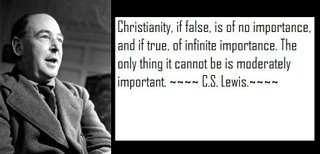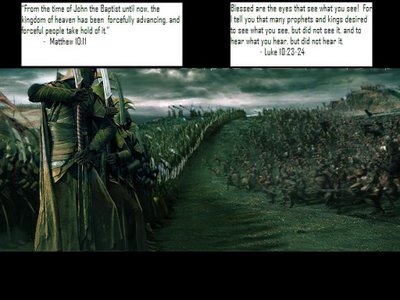Oct 29th, 2006 "Further Reflections on a Transformed Life"Source Scriptures: Romans 12:3-8, 1 Corinthians 14:3
Following story told by Donald Miller in Blue Like Jazz: Non-religious Thoughts on Christian Spirituality
“So I’ve been watching Nightline with Ted Koppel recently. He’s been reporting from the Congo, in Africa, and it’s terrible. I mean, the show is fine, but the Congo isn’t doing so well. More than 2.5 million people have been killed in the last three years. Each of eight tribes is at war with the other seven.
As the images moved across the screen I would lie in bed feeling so safe, as if the Congo were something in a book or a movie. It is nearly impossible for me to process the idea that such a place exists in the same world as my hometown. I met with my friend Tony the other day and told him about the stuff on Nightline.
“I knew that was taking place over there,” Tony said, “But I didn’t know it was that bad.”
“It’s terrible,” I told him, “Two and a half million people dead. In one village they interviewed fifty or so women. All of them had been raped, most of them numerous times.”
Tony shook his head, “That is amazing. It is so difficult to even process how things like that can happen.”
“I know. I can’t get my mind around it. I keep wondering how people could do things like that.”
“Do you think you could do something like that, Don?” Tony asked…looking at me pretty seriously. I honestly couldn’t believe he was asking the question.
“What are you talking about?” I asked.
“Are you capable of murder or rape or any of the stuff that is taking place over there?”
“No.”
“So you are not capable of any of those things?” he asked again. He looked at me to confirm his answer.
“No, I couldn’t,” I told him. “What are you getting at?”
“I just want to know what makes those guys over there any different from you and me. They are human. We are human. Why are we any better than them, you know?”
Tony had me on this one. If I answered his question by saying yes, I could commit these atrocities, that would make me “evil”, but if I answered no, it would suggest I am better evolved than some of the men in the Congo. And then I would have some explaining to do.
So I answered, “You believe we are capable of those things, don’t you, Tony?”
He answered back, “I think so, Don. I don’t know how else to answer the question.”
“What you are really saying is that we have a sin nature, right Tony?”
Tony answered, “Pretty much, Don. It just explains a lot, you know? It’s funny how little we think about it, isn’t it?”
(Use examples of children, and the effect of police)
How many of you today have had children? Now, I want you, if you could, to let me in on a little of the training of your children. Go back, if you would, to your child being four or five years old, or earlier…and imagine a situation where your child has broken mother's favorite plate or dad's favorite mug...or you telling your kid to clean up their toys, only to find them out in the living room putzing around five minutes later. (What might your kid be tempted to say or do if they know what they've done was wrong?)
Now you could imagine, for a second, with how hard it can be to be a parent, why we have to train kids at all? We could wonder, for example, if we had one child that we trained right from wrong and the other we didn’t train at all, which one would be the better child? (The kid you teach right from wrong) That seems obvious to us, but that really should tell us something about the human condition…your condition and mine. We have to be taught to be obedient, respectful, and truthful as kids. It’s a flaw in the human condition. How do we know? Don’t train a kid, don’t give them boundaries, and see what happens. (So how does that apply to committed followers of Christ? Have we ever learned enough or walked far enough as a Christfollower that we can quit? How would that work if we packed it in as a parent with a child and quit instructing? The situation is similar...as God's people, we never quit learning, never quit transforming, and we recognize God knows better than we do.)
Here’s another situation: Why do the cities of Waynesboro, Harrisonburg, or Staunton have cops? (Keep folks in line? What kind of folks?) Sometimes I think if there were no cops, I would be fine. I was taught right from wrong on some level when I was a kid. But the truth is, I often drive completely different when there is a cop behind me than when there isn’t.” Why is that?
If we get caught, we will be punished. But that doesn’t make us good people, it only makes us subdued. The problem is the same it has always been.
I am the problem. (common humanity)
And it comes down to questions about my own motives and actions. I don’t have to watch the evening news to see that the world is bad, I only have to look first at myself. I’m not trying to beat myself down here; I am only saying that true change, true life-giving, God-honoring change has to start with the individual. It doesn’t end there, but it starts there.
The overwhelming majority of time I spend thinking about myself, pleasing myself, reassuring myself, and when I am done there is often nothing to spare for others. Six billion people live in this world, and I spend the majority of my time thinking of one. Me. I AM THE PROBLEM.
I think every conscious person, every person who is awake to how things work in reality, has a moment where they stop blaming the problems in the world on others that aren’t like them, and start to face themselves. And we HATE this more than anything else…it’s SO much easier to pass the blame than buck up and face ourselves. I’m convinced this is the hardest issue I FACE AND WILL FACE as a follower of Jesus. The problem is not out there; the problem is this needy, self-centered beast of a thing inside me.
Now, we could identify ourselves as the problem, and spend the rest of our lives really headed nowhere if we don’t move forward from that: so that begs a question. How can I flip that around and choose to be a living solution instead of a living problem?
Paul anticipates this question from us, and he’s ready for it
(read verses 3-5) …And if you can remember back to last week, when I was talking about Christian service, the outward reality of devoting ourselves to what God is doing to redeem this world, I suggested that we cannot be a follower of Jesus by ourselves. You might have questioned that at the time, but Paul lays it out for us here. (vs 5)
Inflated views of ourselves are very dangerous to our soul. Paul knows this, and calls us to the opposite. When he says in verse 3: “I say to everyone among you not to think of himself more highly than he ought to think,” Paul makes the first task of the renewed Christian mind the death of pride and the cultivation of humility. What’s new about the renewed mind? Pride is put to death; humility begins to grow. And as he moves further, the spiritual gifts of verses 6-8 are to be used in humility. The opposite of high self-regard is not looking at ourselves as a piece of dirt, though it’s a good starting point to figure out our position before God.. The opposite of high self-regard is a humble trust in Christ, which means that the best way to use our spiritual gifts, to NOT waste our lives, to MAXIMIZE our lives is to forget about ourselves as our pursuit of being transformed into the image of Christ spills over in love to other people.
So when Paul moves on to verse 8b: “contributing to the needs of others, give generously; if it is leadership, lead diligently; if it is showing mercy, do it cheerfully.” I think Paul’s point is: when you don’t think too highly of yourself, but you forget about yourself and are filled with love for Christ and others, your ministry has the character of overflow. In giving your joy in Christ overflows with generosity. In leading your joy in Christ overflows with diligence, consistency. In mercy your joy in Christ overflows with cheerfulness. These four words (generosity, diligence, joy, cheerfulness) are meant to show us that Christian ministry is not duty-driven or begrudging. It’s the overflow of a self-forgetting, committed relationship with Christ; one where we grow in relationship with Christ by spending time with Him, by getting to know him…sticking by his side.
Let’s look at three things. First, we’re gonna look at the relationships between the gifts. Second, we’re gonna look at how the gifts form us as people of integrity and consistency in the world. And third, we’re gonna take a glimpse at how each of these gifts might look here at Middle River.
1. The Relationships Among the Gifts Themselves
The main observation I want to make here is that these gifts overlap with each other and even include each other, and are not rigidly defined. For example, in 1 Corinthians 14:3 Paul says, “The one who prophesies...” What do you think is the end of that verse? So here two gifts, encouragement and prophecy overlap.
And if you just look at the list itself, how would you precisely draw a line in verse 8 between contributing generously and doing acts of mercy cheerfully? I mean, it’s obvious that one who is joyfully merciful is a generous person. So these two gifts overlap. Or take “service” at the beginning of verse 8. How will you distinguish “serving” from “doing mercy”? I think the conclusion we should draw from this is that in seeking to receive and use spiritual gifts we should not think rigidly, as if there is a set number, or that they come in separate packages, so that if you have one you can’t have the other. I don’t think Paul would want us to think like that.
Instead, leave to God and our commitment to being transformed in this relationship with Him to determine how God will gift us and use us. Your combination of gifts may—probably will—be utterly different from anyone else’s. I doubt that any Christian has ever had only one spiritual gift, and I doubt that any Christian has ever had the same spiritual gift in the same degree. So instead of us trying to figure out the definitions and boundaries and names and differences we can do this: Go back to verse 1 and hear the call to offer all of ourselves to God. Then we can go to verse 3 and surrender all high and prideful thoughts about ourselves and instead focus on humbly following Jesus…and this is the foundation we rest on. Then begin to let this life overflow in love for other people in all the ways we can. And the ways of love that seem to more naturally flow out of your pursuit of God are your gifts, whatever you call them or whatever mix they are of mercy and service and giving and teaching and encouraging and leading. And this points to
2. How the gifts form us as people of integrity and consistency
If we are committed to knowing the Bible and its instruction for giving us the boundaries within which we can pursue this relationship with God, we should find more and more that these gifts in general display characteristics that all Christians are commanded to pursue.
Take the gift of doing mercy at the end of verse 8. As we grow in Biblical understanding, we find that all Christians are called to be merciful. Jesus said, “Blessed are the merciful” (Matthew 5:7). And he told a parable about a person who was treated mercifully by a king by being forgiven for a massive sum and then goes off and chokes his brother who owed him a couple bucks—and the king responded, “Should not you have had mercy on your fellow servant, as I had mercy on you?” (Matthew 18:33).
Or consider the gift of contributing. Paul says in 2 Corinthians that all of us should be free and willing in contributing, “for God loves a cheerful giver.” So contributing faithfully is an ordinary Christian value: expected of a disciple of Jesus!
So what conclusion can we come to: knowing that some spiritual gifts are things that God expects in some measure from all believers? My conclusion is this: Some of these qualities come more naturally from the reality that each of us is unique; and as we commit ourselves to this process of transformation, we find these things naturally flowing out. In other words, it seems to me that some take unusual spiritual delight in serving, or giving, or doing mercy, or teaching, or leading, or encouraging. The Holy Spirit has shaped their hearts so that they find themselves unusually drawn to these things.
Or it may be that only for a specific season God may come upon a person for an unusual ministry of church leadership or financial contribution which is simply extraordinary. Then after that season the gifting (feeling compelled to give or lead) may subside. This is all bound up in the fact that these are a gift from God, and assumes that we’re listening and obedient to God when he calls on us. This assumes that we’re spending time with God, getting to know him, committing to growing.
So I think the way to seek these gifts is to pray broad, earnest prayers that God would make you joyful and fruitful in every form of Christian love. And I think it would be totally fitting that some of us would have a special burden to become especially gifted in one or the other. And so specific prayers would be fitting even, and maybe especially if, one of these areas is a significant struggle for you. God, I struggle at serving others… it is my deepest weakness. Help me to move from this place to be a more well-rounded follower of You.
3. How Would These Gifts Look Here at Middle River?
Here is one snapshot for each of these gifts.
Service, I suspect Paul has in mind here the practical, often lowly, ordinary needs of people. So my prayer is that God may continue to raise up amongst us ladies and gents who have the gift of service: who joyfully and fruitfully serve. Who say: Is there a need I can fill? Is there a toilet to clean, a committee I can be a part of, SOMETHING I can do. I would love to serve, I’m committed to knowing I belong to this group.
Teaching, I pray two things. First, I pray that everyone who learns anything about God and his ways at Middle River would not be afraid to share with their neighbors and co-workers. And second, I pray that members of our church would see needs in the church, even if they’ve never stepped out in an area, and stand in the gap in that position. That is most obvious in the nursery during morning worship; if we want to be a place where folks with young kids can have an opportunity to have an opportunity to take a breath from parenting and pay attention to their own hearts, we MUST have men and women willing to serve in that capacity.
Contributing, The only way that this church can continue not only to survive but make the step to thriving is if God does two things: he causes each of us to delight in the ordinary, radical, Christian habit of regular, sacrificial, cheerful giving. And, second, he give some of us (over and above) the spiritual gift of contributing with extraordinary generosity (some are poor who have this gift, and some are rich). God knows who those are, and is speaking or will speak to you or me in this area.
Leading, simply, I pray that God will fan the flame of devotion in myself, in the Church Board, and the deacons the gift of committed, consistent leadership, that is, to set the example for others of the pursuit of transformation, of a life committed to Christ and for his word and for the mission of this church. And second, I pray that those in positions of leadership at Middle River would lead by example, by consistency and in humility, not by power or manipulation.
I am continuing to learn from experience and listening to the stories of others, that the path to joy and freedom goes through the dark valley of looking honestly at myself, and I believe that every committed follower of Jesus has to deal honestly with his or her own brokenness. I think Jesus communicated so strongly that we’re all broken, and that nothing is going to change, whether in the Congo, or the Shenandoah Valley, or Middle River Church, until you and I look honestly at the person in the mirror, recognize our natural desire to center our lives on ourselves, and then make the crucial move to lean heavily on God as we commit, with one another, to transformation. This life is both God’s gift and a commitment to discipleship…we need both sides to be a living example that this message we proclaim is real.
Labels: Romans Series




